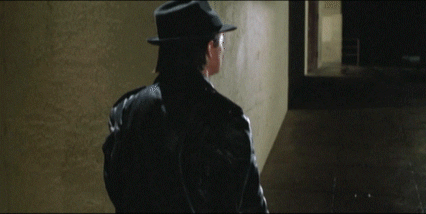When I think back on the worship experiences of my youth, specifically those that took place in the little Baptist church I attended with my parents, I can picture a lot of meaningful moments. I recall the way the pews creaked beneath the weight of the parishioners, the trembling warble of the organ during communion, and the sound of congregational hymns belted out loudly in that diminutive sanctuary, the old men loudly grumbling, “Hasten so glad and free-ee-ee!” while the rest of us sang the melody. When I think of all these things, I smile. For the most part, my church upbringing was a good one. I’m aware not everyone can claim this, of course, so I am exceedingly grateful that I can.

Yeah, this place doesn’t exist.
And yet, there are some things that I can’t remember, not because my memory has been clouded by the density of years, but because the memories simply do not exist. For all the pleasant aspects of that worshipping community who molded me, there were some important elements nonetheless missing from my experience.
For instance, I can’t remember candles in the sanctuary, aside from those stubby ones we used on Christmas Eve – not a single wick burning in a votive or candelabra on any Sunday of year. Neither do I remember the aroma of incense ever filling the room. I have no recollection of a soaked rag on my bare feet, or a thumb tracing a gritty line of ashes upon my forehead. And I can’t even remember a moment of silence – an intentional one, that is, as opposed to those fleeting, quiet moments spent waiting for an usher to climb the stage to give the offertory prayer.
I can’t remember going to a Good Friday service. I do not recall participating in a Maundy Thursday observance. And it wasn’t until graduate school that I dared set foot in an Ash Wednesday service.
Now, it’s not that these worship elements or “holy day” observances were explicitly condemned in my little Baptist church. However, as far back as I can recall, none of them were sanctioned either. (We did get Fridays off of school back then, along with the Monday after Easter, but I think that had more to do with training workshops for teachers than anything religious.)
When it came to these sensory components, and special worship services, a pervading sentiment existed within the majority of church-goers among whom I grew up that such things were extraneous to true worship. Unnecessary. Some went so far as to imply they were detrimental to our faith, possibly even dangerous.

“Pentecost Sunday sounds like it’s for the Pentecostals, boy! You wanna celebrate a feast day, Christmas’ll be here in seven months.”
Just about every person I heard say such things would cite the same reason. They would say things like candles and silence, Ash Wednesdays and Maundy Thursdays, were “empty rituals.” What this meant, it seems, was that such institutions which hailed from past eras and periods of history, if ever they were worthwhile to begin with, were wrung dry of real meaning long ago. This, it seemed, was our community’s predominant holdover from the Reformation, in which Protestant viewpoints challenged the 1000+-year teachings of the Roman-Catholic Church: the numerous conventions, traditions, and customs established during those years were just desolate echoes of significant spiritual devotion. They didn’t – couldn’t – mean anything anymore. They were bankrupt of any eternal weight.
That same sentiment acidified the conceptions and sharpened the tones many of my fellow church-goers held toward other denominations, too. Whenever talk turned to another congregation’s worship, especially those considered more “high church” (translation: different than our own), their brows would furrow with ever-increasing concern. The Lutherans and Methodists down the street were fine… I guess. The Church of Christ folks were tolerable, sure, but they probably needed to get over that whole no-instruments-in-worship gaffe. The Presbyterians a few blocks away were troubling, what with all their sitting, standing, and responsive readings. Then there were the Episcopals who gathered a half-mile further down the road – they were as disturbing as their church building’s maverick architecture. And as for the Catholics on the other side of town, well, how could anyone really worship “in spirit and truth” with the stench of sulphur and brimstone stinking up the place?
Don’t get me wrong. I am deeply thankful for the Reformation, for the courageous and brilliant teachings of men like Luther, Calvin, Zwingli, Knox, Cranmer, Melanchthon, and Simons. And I think in some ways their critiques of worship – differing from one another as they might have been – were necessary indictments of a system that, in a variety of ways, had become sacramentalized into triviality (that is, over-ritualized to the point of folk superstition). Indeed, the Western Church was long overdue for a thorough spring cleaning, and Protestant theology and ecclesiology was the steel wool to the Holy Roman Empire’s tarnishes.
But in the righteous fervor many denominational traditions have exhibited over the last four-to-five centuries to “do church” the right way – free of the constraints of a once-corrupt and power-drunk system – we made the tragic mistake of throwing innocent babies out with the sullied bath water. In other words, rather than carefully demarcating ourselves only from the specific beliefs and policies we found wanting, instead we gathered up everything bearing even a whiff of the other side and chucked it atop the trash heap. So it was that numerous disciplines, practices, and devotional observances, which continue to bear eternal significance, are often nowhere to be found in many “evangelical” churches today. We considered sensory disciplines like silence, visio divina and centering prayer too mystical, liturgical feasts like Epiphany, Annunciation, and Christ the King too obscure, and symbology like ashes, incense, and iconography too esoteric. Generation after generation of Protestant and evangelical pastors decided against teaching how these diverse elements offered deeper perspectives and unique pictures of the mystery of Christ. Instead, we chocked them up to being less effective communicators of the gospel than our preferred worship elements like baptistries and choir lofts, or church observances like sunrise services and Christmas Eve candlelights.

How did folks get by without these back in the Middle Ages?
It’s a shame, really. Because, when freed from the chains of rote tradition, these less modern forms of worship still sing with substantial beauty and depth. Baptists are certainly among the “low church” traditions who, over the years, have tenaciously avoided any activities or practices that looked, sounded, felt, smelled, or tasted Catholic (which more often than not is simply our catch-all synonym for any “mystical,” “obscure,” and “esoteric” worship experiences). And while there may indeed have been some healthy reasons for this kind of distancing a couple hundred years ago, those reasons are head-scratchingly flimsy today.
Because here’s the thing about “empty ritual” – the ritual itself does not choose to become vacant. It is the flesh-and-blood worshippers who, year after year, generation after generation, misuse ritual. We are the ones who drain our rituals of their original meanings, because we have the instinctual, bad habit of taking our eyes off the marvelous views they offer.
It is not unlike living in a small, remote cottage by the sea. When you first move in, you pull your best chair up to the wide rear window and, with a steaming mug of coffee in your hand, sit down each morning to gaze out at the gorgeous scene, and watch the waves tumbling into shore, the cormorants spiraling in the dawning sky, and the sun gilding the surface of the water as it climbs atop the horizon.
But, the longer you reside in the cottage, you cannot help growing used to all this. That ocean view becomes more and more normal and common. Little household responsibilities begin to draw your attention. There are house plants to water, dishes to wash, clothes to hang on the line, not to mention an ever-increasing Netflix queue beckoning you from the other room.

What? Did you think you could really survive out here without an Internet connection?
Now, you’re not so callous that you would ignore the view altogether. After all, that is what makes this little cottage so special to begin with. But the demands and distractions of life bear no respect for morning meditations in front of that window, and after a while not only are you pouring a smaller amount of coffee and spending less time in the chair, but the time you are putting in is no longer coming from a place of inward captivation, but outward obligation. The view from the window never changes, but your reverence for it does. It becomes, in your mind, merely a holdover from earlier days in the house, something devoid of power, even though it is you who no longer submits to its power.
More often than not, this is what becomes of ritual in the Church. Some hold onto it tenaciously even as they lose their own reverence for it, while others reject it outright because they have been told there is no power – no truth – in it. Not anymore, at least. But that is not the case! These disciplines, observances, and symbols established in ancient days by our great cloud of witnesses never lost their power. No, the problem lies with us modern worshippers. We just got lazy, or we got overcritical, or both.
Here’s the kicker: I’m writing this not as an intellectual observation, but out of my own experience of (re)discovery of these ancient, often maligned, practices.
I spent several of my initial years in the ministry searching for a fresh, genuine experience in the faith. I went to a plethora of conferences and festivals, visited churches who promoted and boasted the latest in modern worship methods and styles. I read book after book by pastors and evangelists trying to “repaint” the Christian life in vibrant, innovative terminologies and metaphors. I bounced from worship service to worship service in search of a new, restorative buzz.
But I came up empty.
Then came a single spring in which I unintentionally wandered into experience after experience of ancient, historical worship practices. Out of rebellious curiosity I sat in on an Ash Wednesday service. I read a book about how to pray the Liturgy of the Hours. I explored the Revised Common Lectionary and the Book of Common Prayer for the first time. I even took a week-long field trip to a Benedictine monastery. All of these things would have found most of the members of my small town church furrowing their brow and shaking their heads. I could even hear some of their concerned voices in my head. “Be careful,” they warned. “That stuff looks kind of Catholic-y.”

“They grow their own food?! Looks kind of Communist-y, too.”
Maybe it was. Silence, fasting, and lectio divina are certainly mystical experiences, but that is only because each one is a door into the endless, overarching mystery of the praying life. Anyone who says prayer does not hold a mystical quality should rethink what, at its core, prayer is.
Ash Wednesday, Pentecost Sunday, and All Saints Day were shockingly foreign to my view of what a worship service should look like, but, then again, my view of what a worship service looked like had been the very thing that left me feeling dry. My biggest adjustment to worship style, at that time, was trading three hymns for three praise-and-worship choruses.
And, it turned out, the Benedictines did exactly what I had always imagined monks do, and yet my conversations with them revealed that not only were they otherwise completely normal people, but their own sense of faith and devotion to God was radiant. Evangelicals can say what they want about Catholics, I suppose, but until you spend some quality time with them, you speak more from ignorance than understanding.
So it was that I learned life-renewing lessons that have shaped the way I teach and minister in churches ever since. When it comes to our modern culture’s seeming obsession with the “next big thing,” Christians need not always follow. Sometimes, it’s better to hark back than to leap forward. While the Church must indeed engage and interact with the trappings of modernity, ours is a wealth of fascinating, captivating, and entralling practices and traditions that, while tragically ignored by many believers, still possess untold significance, which the Holy Spirit can and will use to strengthen our faith and sanctify our souls.
The view from the window never changes. The same sea laps the shore, the same birds dance at dawn, and that same sun rises just as glorious as ever. So let us not neglect such undeserved grace. Let us instead dust off and straighten the chair, brew a full pot of joe, and settle in for a fresh gaze upon an age-old view.




































